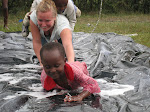The next morning we woke up again bright and early and set off to Nyakanyazi. However we soon realized that our car was not fixed and still leaking. As we stopped on the side of the road for a quick fix-up we saw an enormous baobab tree with a makeshift ladder next to it. It was incredible! Soon after we got back into the car and stopped a small town and ate wali maharagwe (what else?) as our car was at another fundi (mechanic). Once our car was "fixed" we were back on the road until our radiator started to leak again! A bunch of kids came up to our car with the most incredible wooden bicycle equipped with springs and pedals! True ingenuiy! Even though Lali almost broke it, we rode around on it - practicing for the trip. It became clear that our car was a lost cause for the night, so we got a lifty from a nice family through a Lutheran church and they dropped us off in Kibondo while attempting to tow our car. we spent the night in Kibondo as our car was yet again at the fundi. After eating breakfast (some dirty cassava) we got back into our car and drove to Kigoma and Ujiji. Although the car ride was only supposed to take 3 hours, after 7 hours in the car we finally made it to the beginning of our scouting trip! After eating even more wali maharagwe we woke up the next morning to begin our mission.
In Ujiji, we visited the Livingstone monument where we learned the facts behind the phrase "Livingstone, I presume" from the guide with a most hilarious voice! There we met two South African UN workers, who kindly told us to visit Jakobsen beach on Lake Tanganyika followed by joining them atop their UN Hercules cargo plane for sundown. It was a great start to Kigoma and Ujiji, truly a once in a lifetime experience. Our first day in Kigoma and Ujiji went well - we scouted hotels, conference rooms, and welcoming areas for the participants of the bike ride. After a fun filled night with our new UN friends, we woke up the next morning to meet with district commissioners and educational officers. We visited both the Kigoma municipal and Kigoma rural districts and learned a lot about the needs of Kigoma's educational system. Even though we caused some havoc by breaking a table, the officials we met with in Kigoma were happy to allow us introduce TFFT, and make connections for the trip. Our plans for town-hall type meetings with community members and officials of Kigoma seem a definite possibility! After our meetings, we visited the Kigoma public library - a small but filled library with over 400 members, very promising but with a population of roughly 130,142, access to books could be eased somehow and without cost to the community! After watching the sunset on beautiful Lake Tanganyika, Adelaide, Meghann, and I spent our last night in Kigoma and woke up at 5 am to make our trip to Tabora.
Tabora, founded in 1820 by Arab Slave Traders was once a major trading center along the old caravan route connecting Tanganyika with Bagamoyo and the sea has an important role with both education and the history of the slave trade route. The infamous slave trader Tippu Tib had his headquarters there, as it was once the most populated and prosperous town in all of East Africa. It also gained prominence as a regional education center, a reputation that has managed to retain itself today. The "Father of the Nation", Julius Nyerere attended school there.
After staying one day there, we traveled another 8 hours, north towards Arusha, landing ourselves back in Singida. Thankfully everything worked out and somehow we arrived in Arusha a couple days later and in one piece! (The car definitely did not, though). Full of wali maharagwe, baked beans, corn from the can, and more dust than one could ever imagine, we were glad to be at our home in Arusha! Although the trip did not go according to plan, it was a true safari! We learned a lot in Kigoma and definitely began making some important connections TFFT has now introduced its name into different parts of Tanzania, and can hopefully expand into these areas one day in the near future! The bike trip will definitely be an adventure next summer, and we cannot wait. We had a great time, but I dont think the 5 of us girls will ever eat wali maharagwe or get into the car we drove again!





